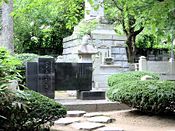|

A memorial dedicated to Gichin Funakoshi was erected by the Shotokai at Engaku-ji, a temple in Kamakura, on December 1,
1968. Designed by Kenji Ogata the monument features calligraphy by Funakoshi and Asahina (1891-1979), chief priest of the
temple which reads Karate ni sente nashi (There is no first attack in karate), the second of Funakoshi's Twenty Precepts.
To the right of Funakoshi's precept is a copy of the poem he wrote on his way to Japan in 1922.
A second stone features an inscription by Nobuhide Ohama and reads:
Funakoshi Gichin Sensei, of karate-do, was born on June 10th, 1870, in Shuri Okinawa. From about eleven years old he began
to study to-te jutsu under Azato Anko and Itosu Anko. He practiced diligently and in 1912 became the president of the Okinawan
Shobukai. In May of 1922, he relocated to Tokyo and became a professional teacher of karate-do. He devoted his entire life
to the development of karate-do. He lived out his eighty-eight years of life and left this world on April 26, 1957. Reinterpreting
to-te jutsu, the Sensei promulgated karate-do while not losing its original philosophy. Like bugei (classical martial arts),
so too is the pinnacle of karate (enlightenment): to purify and make one empty through the transformation from "jutsu"
to "do". Through his famous words "Karate ni sente nashi" (There is no first attack in Karate) and "Karate
wa kunshi no bugei" (Karate is the martial art of intelligent people), Sensei helped us to better understand the term
"jutsu". In an effort to commemorate his virtue and great contributions to modern karate-do as a pioneer, we, his
loyal students, organised the Shotokai and erected this monument at the Enkakuji. "Kenzen ichi" ("The fist
and Zen are one").
|

